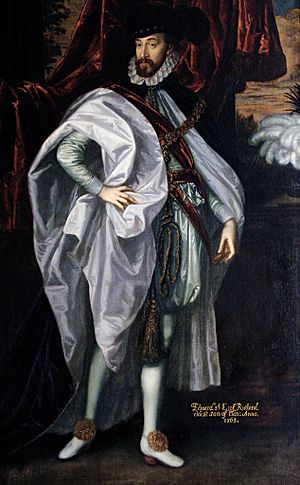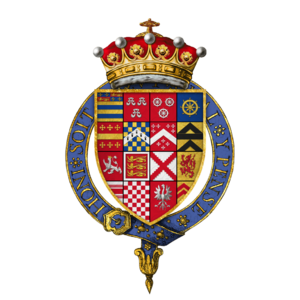Edward Manners, 3rd Earl of Rutland facts for kids
Quick facts for kids
Edward Manners
|
|
|---|---|
| 3rd Earl of Rutland | |
 |
|
| Born | 12 July 1549 |
| Died | 14 April 1587 (aged 37) London |
| Spouse(s) | Isabel Holcroft |
| Issue | Elizabeth Manners, 16th Baroness de Ros |
| Father | Henry Manners, 2nd Earl of Rutland |
| Mother | Margaret Neville |
Edward Manners, the 3rd Earl of Rutland and 14th Baron de Ros of Helmsley, was an important English nobleman. He was born on 12 July 1549 and passed away on 14 April 1587. Edward inherited his father's titles in 1563, becoming a powerful figure in England during the time of Queen Elizabeth I. He was also a Knight of the Order of the Garter, a very special honour.
Contents
Edward Manners: A Young Nobleman's Life
Edward Manners was the oldest son of Henry Manners, 2nd Earl of Rutland, and Margaret Neville. He grew up in a very important family.
Early Life and Education
Edward likely studied at Oxford University, though he didn't officially graduate there. He also visited Cambridge University with Queen Elizabeth I in 1564. While there, he was given a Master of Arts (M.A.) degree. Two years later, he also received an M.A. from Oxford.
When his father passed away in 1563, Edward became the 3rd Earl of Rutland. Because he was still young, Queen Elizabeth I placed him under the care of Sir William Cecil. Cecil was a very powerful advisor to the Queen.
Serving the Queen and Country
Edward Manners was very loyal to Queen Elizabeth I and served her in many ways.
- In 1569, he joined the army to help stop a rebellion in the north of England. He led his own tenants (people who lived on his land) into battle.
- In 1570, he traveled to France, following special instructions from Sir William Cecil.
- Back home, he was given many important jobs. For example, he became the constable of Nottingham Castle and the chief justice of Sherwood Forest.
- He was also made the Lord-Lieutenant of Nottinghamshire in 1574. This meant he was the Queen's main representative in that county.
Edward was also known for his participation in grand events. In 1580, he took part in a big tilting match (a type of jousting competition) at Westminster, where he competed before the Queen. He lived a very expensive lifestyle. When he visited London around 1586, he brought 41 servants with him! He even bought a fancy brooch with a portrait of Queen Elizabeth I, decorated with 53 diamonds.
Important Roles and Final Days
Edward Manners continued to serve the Queen in high-level positions.
- In 1586, he helped negotiate a peace treaty with Scotland. His actions were praised by the royal court.
- Later that year, he was one of the special commissioners chosen to try Mary, Queen of Scots. This was a very important and serious task.
Queen Elizabeth I had promised to make him Lord Chancellor, a very high legal position, after the current one passed away. Sir Thomas Bromley died on 12 April 1587, and for a short time, Edward was called Lord Chancellor. However, he himself passed away just two days later, on 14 April 1587, in London.
Family and Legacy
Edward Manners married Isabel Holcroft on 6 June 1573. Isabel was the daughter of Thomas Holcroft, who was a Member of Parliament.
Edward's Only Child
Edward and Isabel had one child, a daughter named Elizabeth Manners. She was born in 1575. When Edward died, Elizabeth inherited the Barony of Ros. This was an old title that could be passed down to a daughter. However, his other titles, like the Earldom of Rutland, could only go to a male heir. Most of his family's lands also went to his male heir.
Burial and Memorial
Edward Manners was buried in Bottesford Church in Leicestershire. His tomb is still there today. The Earldom of Rutland and the Barony of Manners went to his brother, John Manners, 4th Earl of Rutland.
At Bottesford Church, you can see a beautiful tomb that honours Edward and his wife, Isabel. It was made by a craftsman named Gerard Johnson the elder. Edward's statue shows him wearing full armour, with the special Order of the Garter on his leg. Isabel's statue shows her in the clothes of the time, and their daughter Elizabeth is shown kneeling at her feet. The tomb's inscription tells about Edward's work, including his role in the "troubles" with Scotland.
 | Isaac Myers |
 | D. Hamilton Jackson |
 | A. Philip Randolph |


